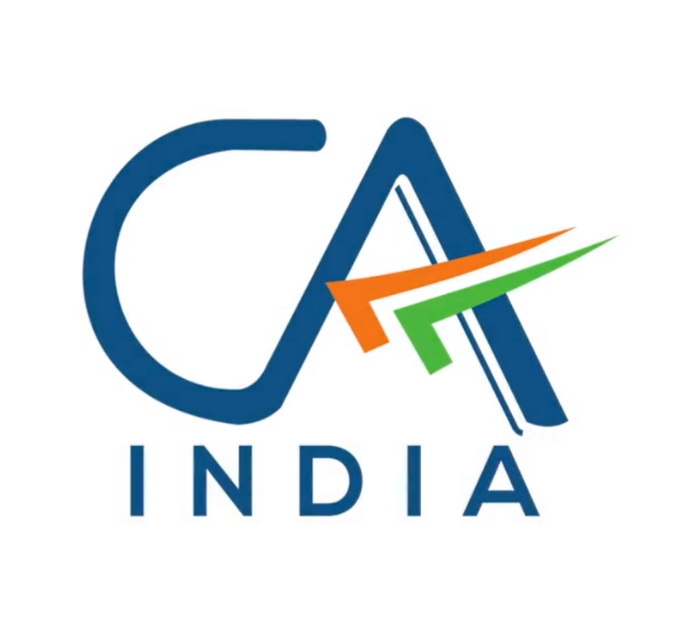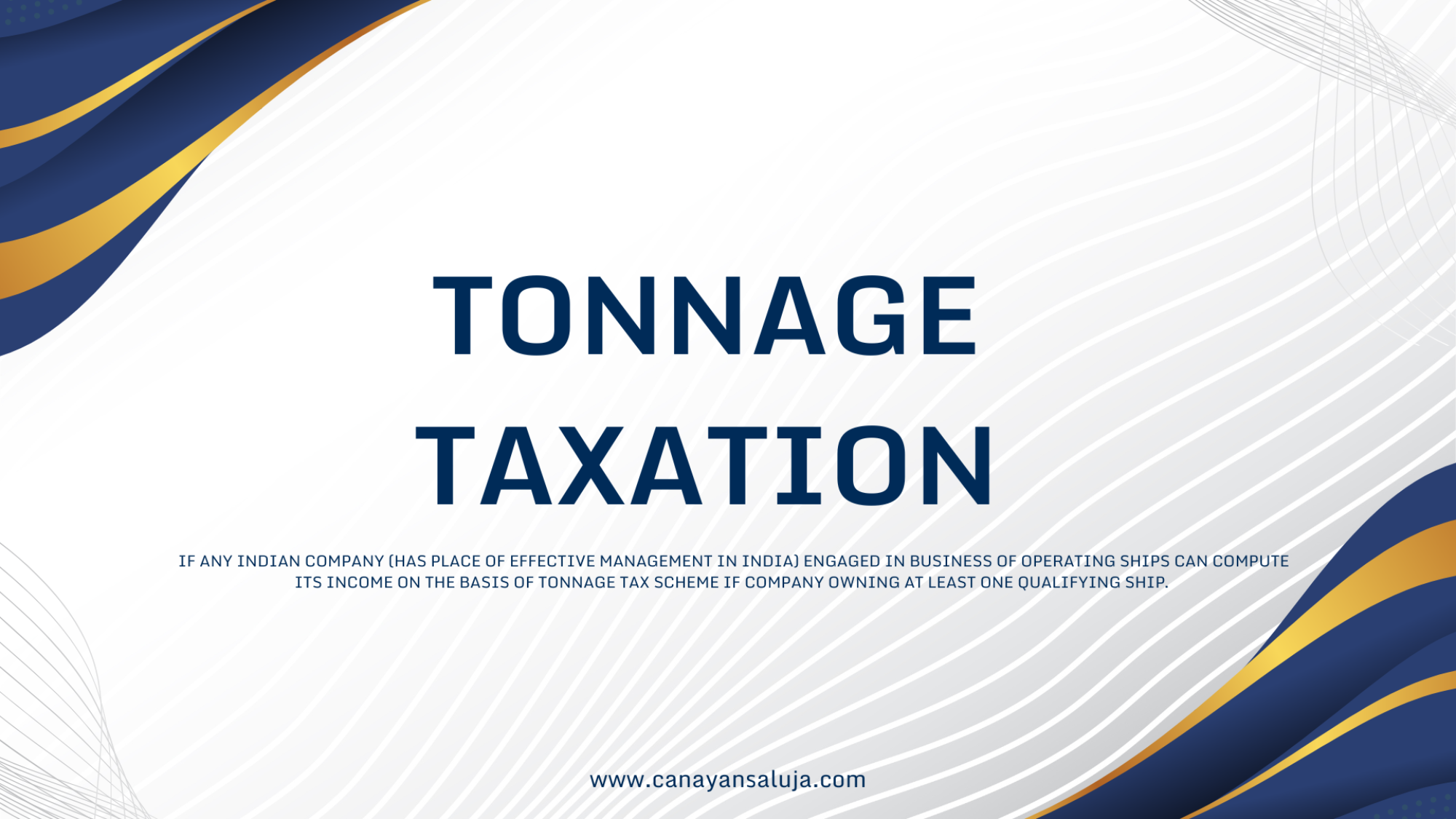.
TONNAGE TAXATION
If any Indian Company (has place of effective management in India) engaged in business of operating ships can compute its income on the basis of tonnage tax scheme if company owning at least one qualifying ship.
QUALIFYING COMPANY (SECTION 115VC)
1.It is an Indian Company.
2.The place of effective management of the company is in India.
3.They own at least one qualifying ship; and
4.The main object of the company is to carry on the business of operating ships.
QUALIFYING SHIPS (SECTION 115VD)
1.Sea going ships/ vessel of Net tonnage Equal or more than 15.
2.Ship registered under Merchant shipping Act or Licensed obtained from DGS.
EXCLUSION FROM THE DEFINITION OF QUALIFYING SHIPS
1.A sea going ship or vessel if the main purpose for which it is used is the provision of goods or services of a kind normally provided on Land.
3.Factory Ship – the ship whose primary use is for the purpose of sport and recreation.
4.Harbour and River ferries.
5.Pleasure craft – the ship whose primary use is for the purpose of sport and recreation.
6.Offshore installations.
7.A qualifying ship used as a fishing vessel for a period of more than thirty days during a previous year.
MANNER OF C0OMPUTATION OF INCOME UNDER TONNAGE TAX SCHEME (SECTION 115VE)
1.The business of operating qualifying ships shall be considered as separate business distinct from all other activities or business carried on by the company.
2.The profit from tonnage taxation shall be computed separately from the profit and gains from any other business and shall be taxable under the head “Profit and gains of Business or Profession”.
COMPUTATION OF TONNAGE INCOME – (SECTION 115VG)
1.The tonnage income of each qualifying ship shall be the daily tonnage income of each such qualifying ship multiply by (a) the number of days in previous year or (b) the number of days in part of the previous year in case the ship is operated by the company as a qualifying ship for only part of the previous year, as the case may be.
.
|
QUALIFYING SHIP HAVING NET TONNAGE
|
DAILY TONNAGE INCOME
|
|
Up to 1000 tons
|
Rs. 70 for each 100 tons.
|
|
>1000 up to 10,000 tons
|
Rs. 700 + Rs. 53 for each 100 tons.
|
|
>10,000 up to 25,000 tons
|
Rs. 5470 + Rs. 42 for each 100 tons.
|
|
>25,000 tons
|
Rs. 11,770 + 29 for each 100 tons.
|
2.For this chapter, the tonnage shall mean the tonnage of a ship indicated in the certificate issued under the Merchant Shipping Act, 1958.
3.The tonnage shall be rounded off to the nearest multiple of hundred tons and for this purpose any tonnage consisting of kilograms shall be ignored.
4.Notwithstanding anything contained in any provision of this Act, no deduction or set off shall be allowed in computing the tonnage income under this chapter.
TRANSFER OF PROFIT TO TONNAGE TAX RESERVE ACCOUNT (SECTION 115VT)
An amount not less than 20% (percent) of the book profit derived from the business of qualifying ships shall be credited to the Tonnage Tax Reserve Account.
Further, please note that, the amount credited to the Tonnage Tax Reserve Account shall be utilized by the company before the expiry of a period of eight years next following the previous year in which the amount was credited: –
(a)For acquiring a new ship for the purposes of the business of the company and
(b)Until the acquisition of a new ship, for the purposes of business of operating qualifying ships other than for distribution by way of dividends or profits or for remittance outside India as profits or for the creation of any asset outside India.
MINIMUM TRAINING REQUIREMENT FOR TONNAGE TAX COMPANY (SECTION 115VU)
A tonnage tax company shall comply with the minimum training requirement specified by the Director General of Shipping and notified in the official Gazette by the Central Government.
AVOIDANCE OF TAX (SECTION 115VZB)
1.The tonnage tax scheme shall not apply where a tonnage tax company is a party to any transaction or arrangement which amount to an abuse of the tonnage tax scheme.
2.A transaction or arrangement shall be considered an abuse if the entering into or the application of such transaction or arrangement result or resulted, in a tax advantage being obtained for (i) a person other than tonnage company; or (ii) a tonnage tax company in respect of its non-tonnage tax activities.
EXCLUSION FROM TONNAGE SCHEME (SECTION 115VZC)
1.Where a tonnage tax company is a party to any transaction or arrangement referred to in Section VZB, the Assessing officer shall, by an order in writing exclude such company from tonnage tax scheme.
.
Provided that an opportunity shall be given by the Assessing Officer, by serving a notice calling upon such company to show cause, on a date and time to be specified in the notice, why it should not be excluded from the tonnage tax scheme.
.
Provided further that no order shall be passed without the previous approval of the Principal Chief Commissioner/ Chief Commissioner.
.
2.The provision of this section shall not apply where the company shows to the satisfaction of the Assessing Officer that the transaction or arrangement was a bona fide commercial transaction and had not been entered into for the purpose of obtaining tax advantage under this chapter.
.
3.Where an order has been passed by the Assessing Officer excluding the tonnage tax company from the tonnage tax scheme, the option for tonnage tax scheme shall cease to be in force from the first day of the previous year in which the transaction or arrangement was entered into.
.
FEW OTHER POINTS
1.Deductions, set off any loss shall not be allowed against tonnage income.
2.Tonnage tax shall not be liable to MAT.
3.Where an assessee opts for tonnage tax but wishes to opt out of the same within 10 years from the date on which he exercised option, he shall not be eligible to opt into tonnage tax for a period of 10 years from the date of opting out.
4.Company should not charter in more than 49% of net tonnage of qualifying ship operated by it. It if crossed that limit then in that year this scheme not applicable.
5.Company shall maintain separated books of accounts and obtain a CA report and furnish it before the due date specified u/s 44AB.
.



Add a Comment